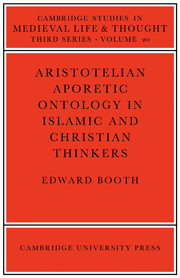Book contents
- Frontmatter
- Contents
- Preface
- Abbreviations
- 1 ARISTOTLE'S APORETIC ONTOLOGY AND THE RADICAL ARISTOTELIAN TRADITION
- 2 THE NEOPLATONIST INTERPRETATION OF ARISTOTLE'S ONTOLOGY
- 3 THE CHRISTIAN ARISTOTELIAN REACTION OF THE SIXTH CENTURY AND MONOTHEIST MODIFICATIONS TO THE NEOPLATONIST LEGACY
- 4 THE ARAB PERIPATETICS: AL-FĀRĀBĪ, IBN SĪNĀ AND IBN RUSHD; AND THE JEWISH PERIPATETICS: ABRAHAM BEN DAVID AND MOSES MAIMONIDES
- STASIMON: THE INTRODUCTION OF THE ‘NEW’ ARISTOTLE AND THE ARAB PERIPATETICS TO MEDIEVAL CHRISTENDOM
- Conclusion
- Appendix
- Bibliography
- Index
3 - THE CHRISTIAN ARISTOTELIAN REACTION OF THE SIXTH CENTURY AND MONOTHEIST MODIFICATIONS TO THE NEOPLATONIST LEGACY
Published online by Cambridge University Press: 05 November 2011
- Frontmatter
- Contents
- Preface
- Abbreviations
- 1 ARISTOTLE'S APORETIC ONTOLOGY AND THE RADICAL ARISTOTELIAN TRADITION
- 2 THE NEOPLATONIST INTERPRETATION OF ARISTOTLE'S ONTOLOGY
- 3 THE CHRISTIAN ARISTOTELIAN REACTION OF THE SIXTH CENTURY AND MONOTHEIST MODIFICATIONS TO THE NEOPLATONIST LEGACY
- 4 THE ARAB PERIPATETICS: AL-FĀRĀBĪ, IBN SĪNĀ AND IBN RUSHD; AND THE JEWISH PERIPATETICS: ABRAHAM BEN DAVID AND MOSES MAIMONIDES
- STASIMON: THE INTRODUCTION OF THE ‘NEW’ ARISTOTLE AND THE ARAB PERIPATETICS TO MEDIEVAL CHRISTENDOM
- Conclusion
- Appendix
- Bibliography
- Index
Summary
In view of the triumph of Proclean Neoplatonism at Athens and Alexandria with Simplicius and Ammonius, the subsequent rehabilitation of radical Aristotelianism is one of the intellectual surprises of the sixth century; it had important consequences, not least of which was the eventual passing on through Syrian intermediaries to Islam of Aristotle's writings with an unqualified reputation. It is not surprising that the Christian Church had used Aristotelian terminology in its Trinitarian and Christological dogmatic formulations, as the basic logic of Aristotle was widely known; and even if their composite philosophical figures were primarily Platonist, Proclus and his followers had conceded a more important place to Aristotelian elements than had Plotinus and Porphyry.
JOHN PHILOPONOS
Foremost in this rehabilitation of radical Aristotelianism was John Philoponos (c. 490–c. 580), who was to become of great prestige among Syrians and Arabs. Though it cannot be demonstrated, some relationship must be presumed to exist between him, the Byzantine theologians who were using Aristotelian categories in their Christologies, the Aristotelianism of Boethius and the Aristotelian element in the thought of Pseudo-Dionysius. Not that the subsequent history of the school of Alexandria was entirely Aristotelian: two pupils of Ammonius's pupil, Olympiodorus, are reckoned as Christian Neoplatonists – the Illyrian, Elias, and the Armenian, David. It is a tempting hypothesis that, alongside the tradition of radical Aristotelianism from Philoponos to the Syrians and Arabs, there was also a link between such Christian Neoplatonists and monotheised Neoplatonism among the Arabs, which their Aristotelians had to overcome.
- Type
- Chapter
- Information
- Publisher: Cambridge University PressPrint publication year: 1983



